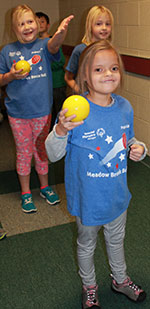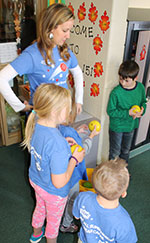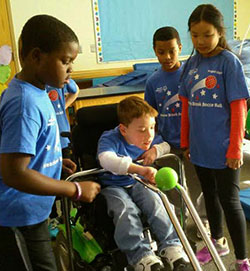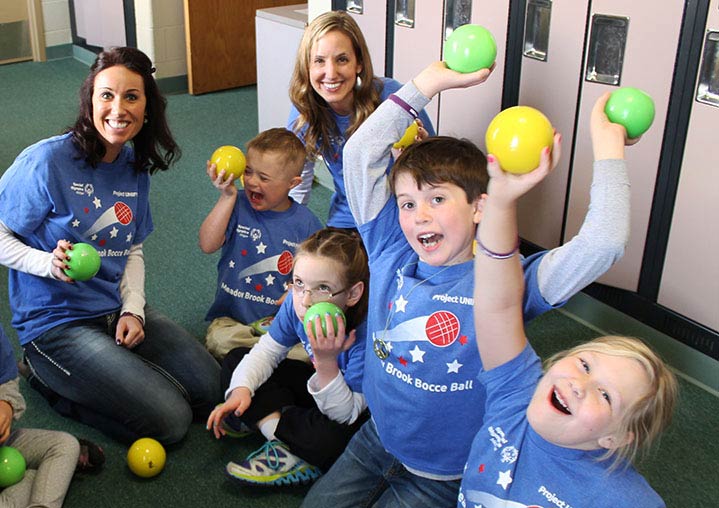As second graders at Forest Hills’ Meadow Brook Elementary School, Zada Karas and Korey Festian know what Project Unify is all about.
“We get to make new friends that we probably wouldn’t get to meet outside of Project Unify,” said Zada. It really is that simple.
Students at their school have always been sensitive to the needs of others. Still, they’ve taken their sensitivity to another level this year with a $3,000 grant from the U.S. Department of Education and help from the Special Olympics.

A new program begun this school year called Project Unify, an international effort in partnership with the Special Olympics, aims to blur the lines between general and special education students to make schools a welcoming place for all students. District Social Worker Ginny Grit and Meadow Brook special education Teacher Barbara Sluiter last school year laid the groundwork for Project Unify when they put in place the school’s LINKS program.
LINKS stands for loyal, interested, nurturing and kind students, pairing general and special education students as peers to create person-to-person connections that focus on similarities rather than differences. Through Project Unify, those connections have been magnified to a new degree that has brought about what school leaders say are some amazing changes in the perceptions students have about their peers.
“It’s not like everyone wasn’t embracing diversity before but the students now look at it as being awesome and cool to be a leader,” Grit said. “It has kind of shifted the whole culture of the school.”
Typically seen in secondary schools, the youngest group of students in Michigan to take part in Project Unify has drawn the attention of Lt. Gov. Brian Calley, who recently visited the school. Calley said he was impressed by how the younger Meadow Brook students have taken a leadership role in forging life-changing relationships between general and special education students.
Calley talked about his 8-year-old daughter’s autism and his family’s efforts to surround her with what he called a new reality in which disabilities “aren’t that big of a deal.” He asked school leaders to imagine themselves after a lifetime as targets of doubt and low expectations.
“If everybody in this room had everybody around them focus all their lives on all of the things we didn’t do well, we would all be failures and yet that seems to be the kind of mindset we build around people with disabilities,” Calley said. “You really have to kind of equip the rest of the world to get over it.”

The Meadow Brook grant helps support four main initiatives in trying to create the kind of culture of acceptance that Calley is talking about. The initiatives include adoption of a unified sport, community service or learning projects, a school-wide campaign to accept and embrace people of all ability levels and celebrate diversity and formation of a youth activation committee, similar to a student council.
Meadow Brook adopted bocce ball as its sport and students will find the game included in their annual field day this coming spring. Special Olympics Michigan is partnering with the school and ordering equipment, including youth athlete kits and other items to make obstacle courses, among other things.
Teacher Barbara Sluiter said Project Unify has benefited students of all abilities by teaching general empathy toward others and forging fast friendships leaders hope will last into later life when they can be even more useful.

“What I see on my end is that friendships have formed; friendships that go above and beyond the school setting,” Sluiter said. “We’ve seen some play dates where special education students have invited general education students over after school.”
“I see a greater general empathy and a deeper understanding of what kids can and cannot do and the ability to be a leader and stick up for someone if needed,” Sluiter added. “Sometimes that’s not needed so much at the elementary level, and the hope is that since we’re starting at a young age these friendships will continue when the kids are older.”
Grit and Sluiter say general education parents like the program because they see their children acting as leaders. Special education parents like the program because they see their children being included.
“Sometimes the general education kids will teach their parents about compassion,” Sluiter said. “We’ve received emails from parents thanking us for allowing their children to be part of this because they’ve seen how it affects their kids in positive ways, in their school work and just wanting to come to school.”
CONNECT
Special Olympics Project Unify










